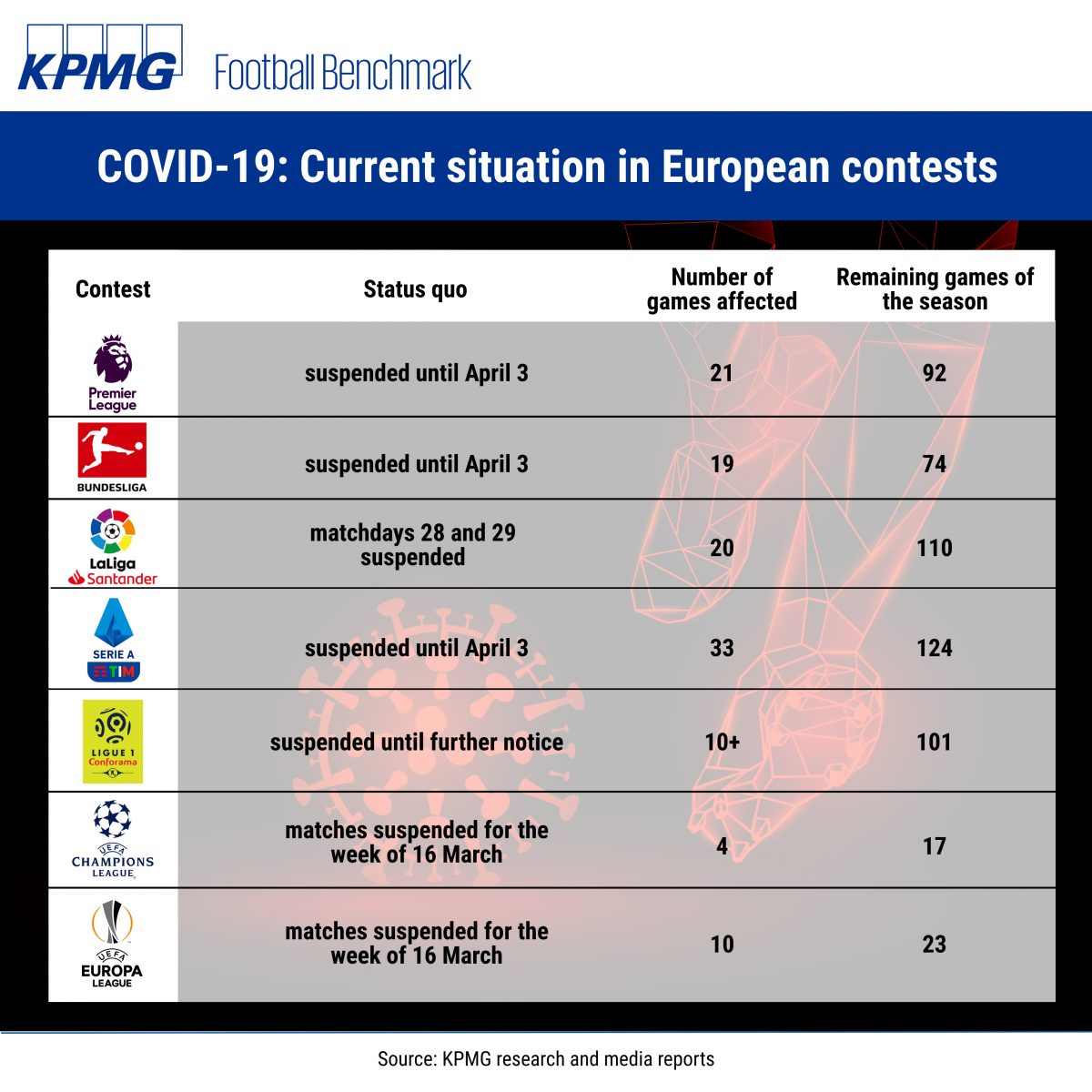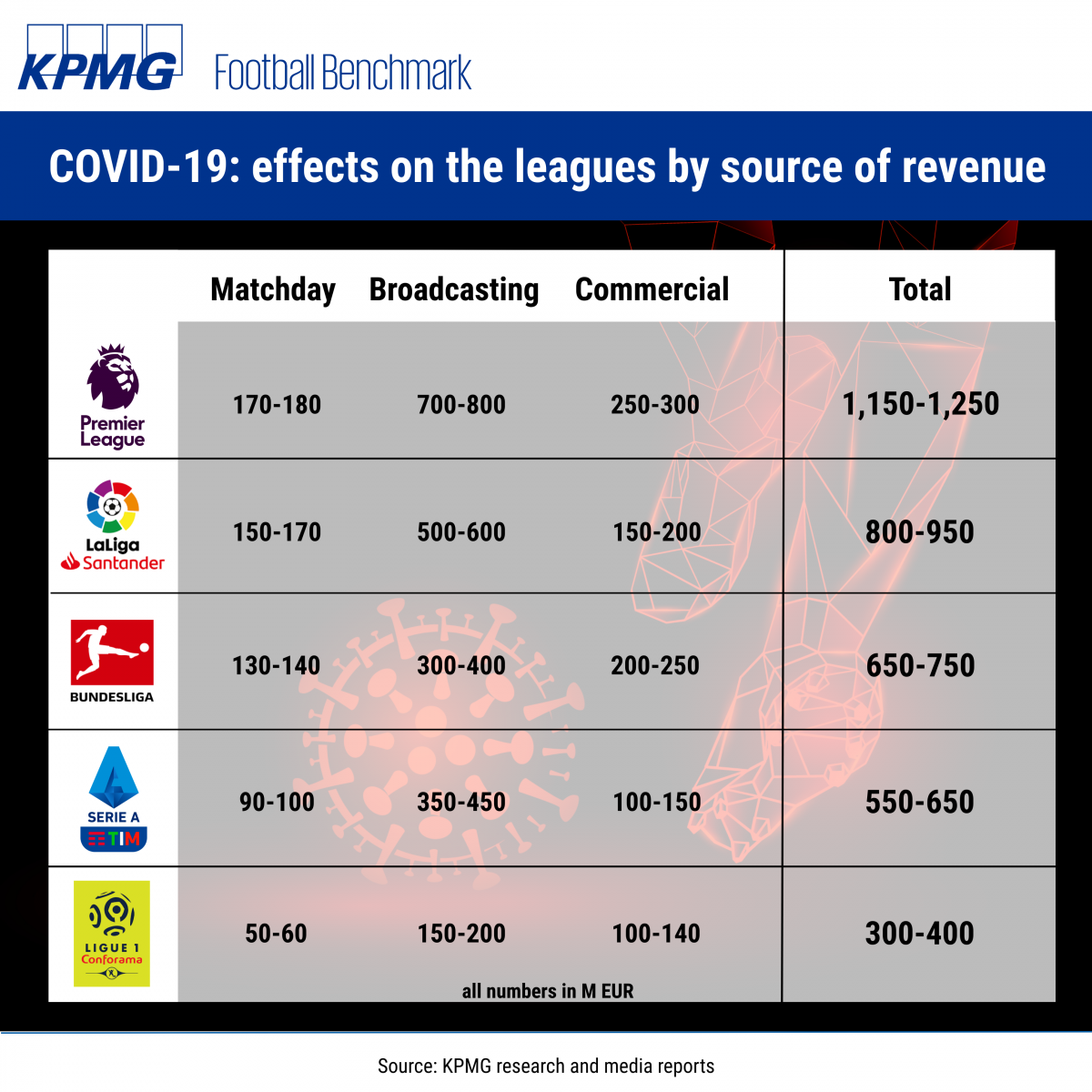Only a fortnight ago, among the first reactions to the coronavirus spreading across Europe, some fixtures in Italy and Spain were decided to be played behind closed doors. Now, in mid-March, all of sport has been suspended, from the NBA to the MLS, from the Giro d’Italia to Formula 1, and from cricket to football in many countries. All of the top five European football leagues, together with the UEFA Champions League and Europa League have suspended games, hoping that fixtures may resume in April. However, according to the most widely accepted scenario, the coronavirus pandemic is expected to reach its peak in Europe around May-June, therefore, returning to football any time soon seems increasingly unlikely.
The situation brings an unprecedented complexity of logistic, financial and legal issues and dilemmas to the European football ecosystem. The current postponements have been implemented to gain some time to come up with solutions that are the least painful in the given circumstances. Hereby, we offer a summary of the key questions to be addressed and the expected loss of revenue should any of the big 5 European leagues be canceled with still so many matches to play as shown in the chart below.

What can happen in the domestic leagues?
Most top championships have turned into the last phases with about a quarter or a third of the total games in the season still ahead to decide the final league positions. Although there is dedication to finish the year, even at the cost of abandoning domestic cup competitions or international ties, having to cancel the season is a possible scenario, too. It is also important to note that the remaining fixtures would take several weeks to be completed, while some players' contracts will end on 30 June. Going beyond such deadline could be challenging.
But how should the current season be finished? Simply voiding it, with no champion or final positions declared, or announcing a season finish according to the current status quo? Or should the next season be delayed as long as required to finish the current one? Some suggest to restart in the autumn with the same teams in the same divisions, but how to deal with expired players’ contract? Others would go for promotion and relegation either based on the positions as they currently are or have play-offs. A further idea is to have promotions only but no relegations for the next season.
How would a status quo-finish affect top spots that guarantee entry into the Champions League or the Europa League? Will those clubs who currently just miss the top spots accept such a solution, or would they litigate, arguing that with many games still to go, they would be able secure such positions?
Finishing in a top spot, or being promoted/relegated – these are issues that are important not only for prestige, but even more for the financials involved. And money is at the heart of all matters here – matchday revenue losses, payments to clubs depending on league position, the promise of revenues with promotion and losses with relegation, top finish opportunities considering the revenues on offer in the European club tournaments, potential contract renegotiations affecting sponsorship, TV and commercial revenues, top clubs’ canceled pre-season tours outside of Europe, to name some of the key matters at stake.
This chart shows our estimates of the potential combined maximum losses the top 5 leagues may face in the major revenue streams assuming a worst-case scenario with no more games played in the current season.

The immediate effect is obviously a loss in matchday revenues. Interestingly, the bigger and financially stronger a club is, the less significant that loss for their overall financial performance would be, even if they usually have bigger stadia and higher matchday attendance, and thus higher matchday revenues, too. Leaving aside legal aspects, clubs will also have to decide if they reimburse fans for season tickets or not. Major clubs may have “business interruption” insurance to cover losses in matchday revenues, but how common is that? The money spared on travel costs for away games or on the organisation of home games (security, stewards, cleaning, etc.) is likely marginal.
Broadcasting income, in some countries, depends on the number of times a club’s matches are shown live. Broadcasters, who have collective deals with leagues may claim that they want money back proportionally if matches are cancelled and the season is not completed. How many deals will be disputed, and at what cost? On the other hand, will they have to give subscribers refunds if the season is cancelled? It should also be noted that most clubs are discounting expected revenues derived from broadcasting deals through banks and factoring companies. A partial refund of those revenues will place a significant burden on the clubs’ cash flows.
Customized commercial and sponsorship contracts often include fixed and performance-based components, bonuses or penalties on performance and achievement of certain goals, such as UCL qualification, relegation, etc. Again, how many deals will be disputed? Do clubs have insurance for such situations? Does the coronavirus constitute a force majeure?
On the cost side, will clubs pay fully their players who do not play? The upcoming weeks may be treated as a holiday period, but what happens if matches are delayed for longer? Will clubs pay other staff, including trainers or medical staff when there is not even training held for weeks or months?
The impact is not limited to the operating activities of football clubs, but will also affect their operations with players, which constitute the most valuable assets of any club. In this regard, how will the transfer market be affected? Some expect that the summer transfer window will be shortened, some fear that big clubs may try to take advantage of the situation and sign players on the cheap from clubs who cannot cope well with the loss of revenue caused by disruption of their business.
Can solidarity, and government intervention like in other sectors of the economy, ease some of the pain? Will big clubs be thinking about the smaller clubs when coming to their conclusions? These and some other questions remain unanswered at present, but will have to be addressed as soon as possible once the pandemic will show signs of retreat.
What will happen to international competitions?
Regarding European club competitions and even more the upcoming EURO 2020, the advantage is that their timeframe can be more flexible, even if they all depend on how domestic leagues find their own solutions.
According to the latest news reports, UEFA is considering moving Euro 2020 to December to allow enough time for the domestic championships to be completed over the summer, or postpone the tournament to the summer of 2021. Priorities are the same regarding the completion of this season’s Champions League (with 17 matches on hold), and Europe League (with 23 ties still to be played), but a solution must consider that a new season is set to start for both competitions with the preliminary rounds in June-July. Beyond logistics, UEFA may face very similar legal challenges to clubs, too, if commercial and TV deals are disputed because of the disruption.
European football's governing body, together with representatives from its 55 member associations, leagues and players’ representatives is holding a video conference meeting today to discuss the scheduling of national competitions, Euro 2020 and UEFA’s club tournaments. Amid such extraordinary challenges, only one thing is definite: the amount of money at stake is massive and for some clubs, a cancellation of club competitions at both national and European level could prove to be financially unsustainable. The unprecedented complexity of issues requires unprecedented flexibility, wisdom and cooperation from all parties at all levels.


